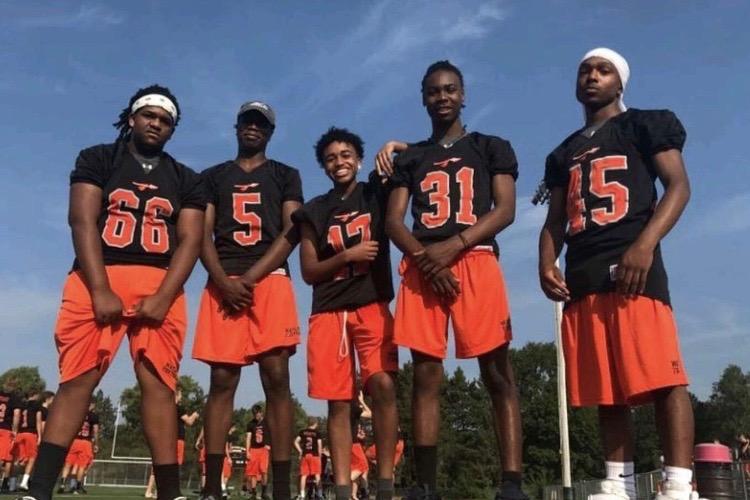Shawn Bernier: It’s hard being an African American and transgender, because it’s double odds against you in society
Everyone struggles in some way in middle school, from relationships and friendships, to hormones and homework. For current sophomore Shawn Bernier, add the stress of coming out to your friends, family and peers as transgender.
In seventh grade, Bernier began his transition from a female to a male. Bernier was born Nia, a girl.

Bernier always felt different from other girls. He refused to wear dresses and rebelled from his feminine name as young as six years old.
“In my first grade class, we had a spelling test.” Bernier said. “Instead of writing Nia, I wrote Nick. I came home, showed my mom because I got a good grade on it, and she was wondering: ‘Who’s Nick? Did you steal someone else’s test?’ They were all subtle notes, but it was pretty obvious.”
In seventh grade at Wayland Middle School, Bernier decided to try out for the boys’ basketball team instead of the girls’ team because all of his friends were also trying out for the boys’ team. One of his teachers, Ms. Posner, talked his decision through with him.
“I remember in seventh grade, I wanted to try out for the boys’ basketball team. Ms. Posner asked me if it was a deeper subject than just me wanting to play with my friends on the basketball team,” Bernier said. “I told her I didn’t really know, but deep down inside I knew what it really was. She began digging deeper with me on the subject. Later on, we came to terms with what I was feeling, which was me being transgender.”
At first, Bernier recognized that he was sexually attracted to members of the female gender. But he still didn’t feel that “lesbian” was the correct term to describe him.
“I always felt inside that it wasn’t just the term ‘lesbian’ for me,” Bernier said. “It didn’t really fit with my description or feelings.”
Bernier came out as a transgender male in middle school.
“Before [the transition] my voice was more of a female’s: high,” Bernier said. “Now it’s more like a male’s, it’s deeper and stuff. And my appearance is more of a male’s physique. I would say that would be the factor that was lifted up with the testosterone. It did give me my wants. On the depression factor, I would say it did make things a lot easier.”
Bernier eventually announced his transition to members of the class of 2020 in homerooms. According to Bernier, the general feeling among his peers was confusion.

“There was a lot of confusion, especially at that time in life, I would say for anyone,” Bernier said. “Basically [transgenderism] wasn’t very known. No one really knew what [being transgender] meant, or what it was. I would say practically [no one] experienced it.”
Even members of his own friend group needed time to adjust to the prospect of his transition.
“There was a lot of confusion within my friend group,” Bernier said. “But then there wasn’t much confusion at all, because everyone knew who I was as a character, so me showing signs of this or actually coming to terms with it wasn’t surprising. It was more like ‘tell me more’ than hate comments regarding my friends.”
Bernier learned to deal with those questioning his transition.
“Outsiders were more scared, or nervous, or didn’t know how to approach me,” Bernier said. “So it was kind of weird to know they were fine with terms like ‘lesbian’ or ‘gay,’ but when it came to ‘transgender,’ they didn’t know how they felt about it. I understand it is something that is hard to swallow, I guess. It is what it is.”
Bernier’s family, however, accepted his transition wholeheartedly.
“Out of everyone in my family, [my father] was the number one person who said, ‘Okay, where can we go next because it’s not about me who we need to be focusing on, it’s about you.’ He definitely took a lot of steps into helping me figure out who I am, and he definitely helps to get me the resources that I need,” Bernier said. “After that, I would say my mother [is supportive] because she helped pay for the medical stuff and got me the gender therapist so I could be prescribed medicine,” Bernier said.
Though he found acceptance from those close to him, Bernier faced aversion for his transition from outsiders, typically people he barely knew.
“Outsiders and random people [were not supportive]. Back then, I was really big on Instagram and some people that I saw before on the streets, or a person that knew of me would DM me saying some random stuff like ‘Who do you think you are? You are a confused lesbian.’” Bernier said. “Sometimes it would get to the extent where I would get death threats from random people, or just people that were from the streets of Boston…. People would tell me that I’m sinning [against] God.”
For Bernier, being an African American male also played, and continues to play, a role in his transition.
“I don’t know why, but it’s stigmatized to say that transgender, gay stuff is ‘white people things.’” Bernier said. “But I don’t believe that, of course, because I’m proof of that not being true. It was hard [hearing] things from the community. [People] would say, ‘oh it’s the absence of your father.’ or ‘your family played a role in why you act this way.’ But deep down, it’s really just who I am.”
Although Bernier has faced adversity for being both a black male and transgender, he understands that challenges are a part of life.
“It’s hard being an African American and transgender because it’s double odds against you in society,” Bernier said. “But that’s just how it is in life, there’s not going to be an easy route for anybody.”
Bernier’s experience is reflective of a survey conducted by The National LGBTQ Task Force that states that “black transgender and gender non-conforming people face some of the highest levels of discrimination of all transgender people according to a new analysis released today.”
Despite the negative onslaught of direct messages from unknown haters, Bernier stayed strong and continued his transitioning, starting with medical changes at age 14.

“Every Thursday, I inject .25 milliliters of testosterone,” Bernier said. “Either into my thigh or my stomach, any place that has fat.”
Now in his sophomore year at Wayland High School, Bernier is President of the WHS Power club and plays football in the fall. His friends and classmates know him as Shawn, a male.
“Shawn is a leader. His intuition and initiative gives him the ability to keep everyone up in good spirits,” Bernier’s friend, sophomore Kuran Freeman said.
Bernier encourages others to not be afraid to be true to themselves.
“For the ones that are in motion of transitioning, just know that if this is what [you] really want, then this is the best way to go and I am very proud of those who are taking those steps,” Bernier said. “As for the ones that are still ‘in the closet’ or haven’t said anything, the fact that you can acknowledge whether there is change needed is a big step in becoming who you want to be.”
Your donation will support the student journalists of Wayland High School. Your contribution will allow us to purchase equipment, cover our annual website hosting costs and sponsor admission and traveling costs for the annual JEA journalism convention.

Charlie Moore, class of 2020, is a fourth-year journalism student and fourth-year reporter for WSPN. He is a Co-Editor-in-Chief for WSPN. In...





![Last Wednesday, the Wayland School Committee gathered to discuss a number of topics regarding the health curriculum and Innovation Career Pathway course. Another large topic of conversation was the ways to potentially mitigate distracting cell phone usage. "These [phones] are going to distract your learning and social relationships," Superintendent David Fleishman said. "That's concrete right there."](https://waylandstudentpress.com/wp-content/uploads/2025/06/Screenshot-2025-06-04-at-9.49.31 PM-1200x886.png)
























Abby McCarthy • Jun 26, 2018 at 12:54 AM
As an LGBTQ alumni of Wayland High School, I am very proud that people at WHS are taking the time to share and respect the stories of LGBTQ people in our community, especially the voices of black LGBTQ students. Thank you Charlie for writing this article. It makes me happy to hear that a Wayland teacher had a positive discussion about identity with this student. At Wayland, I know I was lucky to have a good number of teachers who encouraged me to be my authentic self in school. Thank you Shawn for sharing your story and being yourself! Best of luck with all future endeavors.
Andrea • Mar 29, 2018 at 5:21 AM
Beautiful article! I’m so happy to see so much loving support for you Shawn. Thank you for being an inspiration to so many others by simply choosing to be yourself. That task may sound easy yet it’s one of the hardest decisions anyone can face daily.
Jazzy • Mar 23, 2018 at 11:19 PM
Shawn you are amazing!! I absolutely love your spirit. Very nice article.
Glad • Mar 22, 2018 at 3:39 PM
Inspirational & Real! Shawn continues to live to the fullest and lead by example. Words cannot describe just how proud of him I am. I am more than 2x his age and I continue to be inspired by how he handles his day to day like a pro. Keep doing what you do Shawn #G.O.A.T.
Elsie Cerrone • Mar 22, 2018 at 1:45 PM
Inspiring young man!!1 Shawn it has been a privilege knowing you……fun too!! Ms. Cerrone
PS….well written Charlie!
Daphney • Mar 22, 2018 at 11:12 AM
I am beyond proud of my stepson and my husband for being his biggest cheerleader from day one.
Your father and I’s love and support will always be there as it was from the start and we will do whatever we can to protect you.
People need to be more open minded and less judgmental especially in the black community.
We knew he was different since he was 6 years old and Shawn has basically taught us a lot through his transition. He has remained the same smart, funny, and caring soul he always was and his strength to be unapologetically himself is truly inspiring.
Andrew • Mar 22, 2018 at 10:58 AM
Great mindset you have. Keep it you will be great.
briana • Mar 22, 2018 at 8:12 AM
amazing!!
Monica Yurnet • Mar 21, 2018 at 10:32 PM
What a great article.
Keep rising!
Chanel • Mar 21, 2018 at 9:51 PM
Yes Shawn!!! so proud of you for continuing to blaze your path and sharing your journey with others without fear of judgement. Good Job on the article Charlie.
delaney • Mar 21, 2018 at 10:52 AM
Important story well told.
Lindsey • Mar 21, 2018 at 9:29 AM
Really enjoyed this article. I thought it was a very strong and meaningful topic and really emphasizes how much Shawn has gone through…
alum • Mar 20, 2018 at 9:09 PM
Great article, Charlie! Nice job with a sensitive subject.
moni • Mar 20, 2018 at 6:10 PM
I loved it!